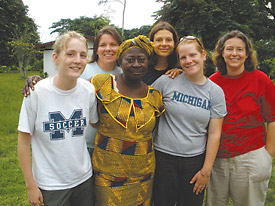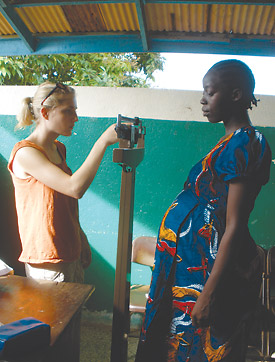Watch to an audio slideshow about a School of Nursing trip to Liberia >
A School of Nursing researcher and three graduate students will spend three weeks working in rural Liberian hospitals and clinics this month. The students will be challenged to hone their midwife and nursing skills in an impoverished country still recovering from years of civil war.

Above, Liberian public health nurse Gertrude Gorma Cole, third from left, with School of Nursing students, from left, Ashley Benedict, Jennifer Huber, Gretchen Ruczynski, Grace Savercool and Laura Mason. Below, School of Nursing student Ashley Benedict takes the weight of a pregnant Liberian woman. Photos by Jodi Lori 
Jody Lori, a clinical assistant professor and certified nurse-midwife, will lead the group. The trip is part of an ongoing effort to expand international clinical study opportunities available to School of Nursing students, Lori says.
“Within the School of Nursing we’re trying to increase our global initiatives so students have the kinds of real world experiences they rarely gain when constrained by classroom walls and the boundaries of Southeast Michigan,” Lori says.
The students will work in and around the Phebe Hospital Compound in Suakoko, about a four-hour drive from Monrovia, the Liberian capital.
It will be the second time in the past year that Lori has led a group of U-M nursing students to the Phebe compound. Last June six undergraduates enrolled in the Community Care Nursing course spent two weeks there. Last year’s trip marked the first time that the clinical portion of the course was conducted in another country.
“It was really an eye-opener for them,” Lori says.
“One of the things that the students took home from this experience was the impact that a single person can have in a country like Liberia,” she says. “They came back very enthused about wanting to continue doing work there, to continue to promote other people doing work there, and to help the people of Liberia.”
The area around Phebe Hospital was devastated during civil wars that raged in Liberia, on and off, between 1989-2003. The hospital has no running water and no electricity on a regular basis. Many of the area residents were displaced by the wars and have little access to health care.
The six second-degree undergraduate nursing students helped in rural community clinics: weighing patients, taking their blooding pressures and performing other tasks. They experienced the challenges of working in a country without a solid health-care infrastructure and lacking basic medical equipment and supplies taken for granted in more well-off countries.
Some of the students witnessed the deaths of women and children who might have been saved if the necessary resources had been available, Lori says.
“Every night we came back and we had dinner together and we debriefed on the things that we saw during the day,” Lori says. “And I think it’s really important that students are able to go on trips like this with faculty members so that they have that opportunity to have that debriefing and to process what they’re seeing on a daily basis.”
Next month Lori will return to the Phebe Hospital Compound with three graduate midwifery students who will “live the life of a midwife” for three weeks. They will provide pre-natal care, help deliver babies and conduct post-partum rounds.
Lori sees next month’s trip as another step in establishing a long-term relationship between the School of Nursing and the people of Suakoko.
“Each time you return, you reinforce the relationships you’ve established,” she says. “The people are excited to see you come back. They know you and they trust you, and that makes a big difference in building relationships over time.”

